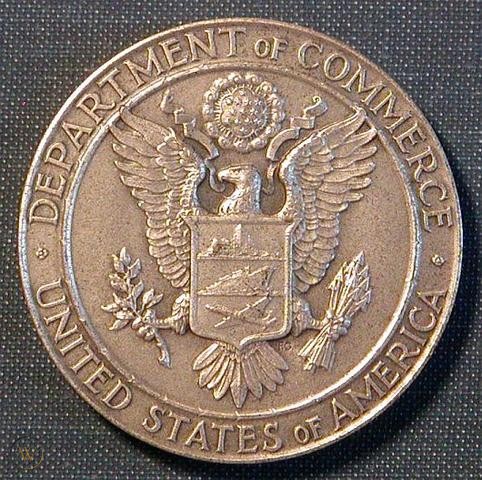NIST-IBBR Researchers Awarded Department of Commerce Silver Medal for Developing and Accelerating Industry-Adoption of Structural Methods for Biopharmaceutical Characterization
Fri, Jan 14, 2022
NIST-IBBR scientists shared in a 2021 Department of Commerce (DOC) Silver Medal Award, the second highest honorary award bestowed by the United States Department of Commerce. Kyle Anderson, Luke Arbogast, Robert Brinson, Frank Delaglio, Ioannis Karageorgos, Jeffrey Hudgens and John P. Marino were recognized with their NIST colleagues Ryan Evans and Anthony Kearsley for “developing and promoting adoption of methods to determine protein structure that increase patient access to life-saving biosimilar drugs.” This prestigious award was presented to the recipients at the 49 Annual NIST Awards Ceremony on January 12, 2022, by James Olthoff, NIST Associate Director of Laboratory Programs, Performing the Duties of the NIST Director.
the United States Department of Commerce. Kyle Anderson, Luke Arbogast, Robert Brinson, Frank Delaglio, Ioannis Karageorgos, Jeffrey Hudgens and John P. Marino were recognized with their NIST colleagues Ryan Evans and Anthony Kearsley for “developing and promoting adoption of methods to determine protein structure that increase patient access to life-saving biosimilar drugs.” This prestigious award was presented to the recipients at the 49 Annual NIST Awards Ceremony on January 12, 2022, by James Olthoff, NIST Associate Director of Laboratory Programs, Performing the Duties of the NIST Director.
The team was honored for advancing state-of-the-art methods for determining the higher order structure (HOS) of biotherapeutics. It led two technically challenging international comparison studies focused on high-resolution NMR and HDX-MS methods. The studies established baseline performance data to enable their routine use by industry to measure the HOS of biotherapeutics and have become recognized as the gold standard for accuracy and reproducibility. Additionally, the teams developed new data acquisition and analysis tools and new hardware to address method limitations that have hastened broad industry adoption and provide a foundation for measurements that ensure quality and accelerate development of biopharmaceuticals and biosimilars. Adoption of these precise analytic tools helps ensure consistent manufacturing of high-quality biotherapeutics and speed the development of biosimilars by reducing the need for long and costly human clinical trials.
Biotherapeutics —large, complex protein molecules—are used to treat serious and life-threatening conditions such as cancer, autoimmune disorders, infectious diseases, and most recently COVID19. Biosimilars are highly similar versions of the originally developed biotherapeutics that are being introduced into the market after innovator drug patents have expired. Global sales of biopharmaceuticals reached nearly $270 billion dollars in 2020. Therapies composed of monoclonal antibodies are the most common type of biopharmaceutical.
Any change in the higher order structure of a protein can prevent it from functioning properly: Biotherapeutic proteins that deviate from their designed shape will not hit their intended therapeutic targets. This compromises the effectiveness of the therapy, and might lead to an unwanted and potentially dangerous immune response.
